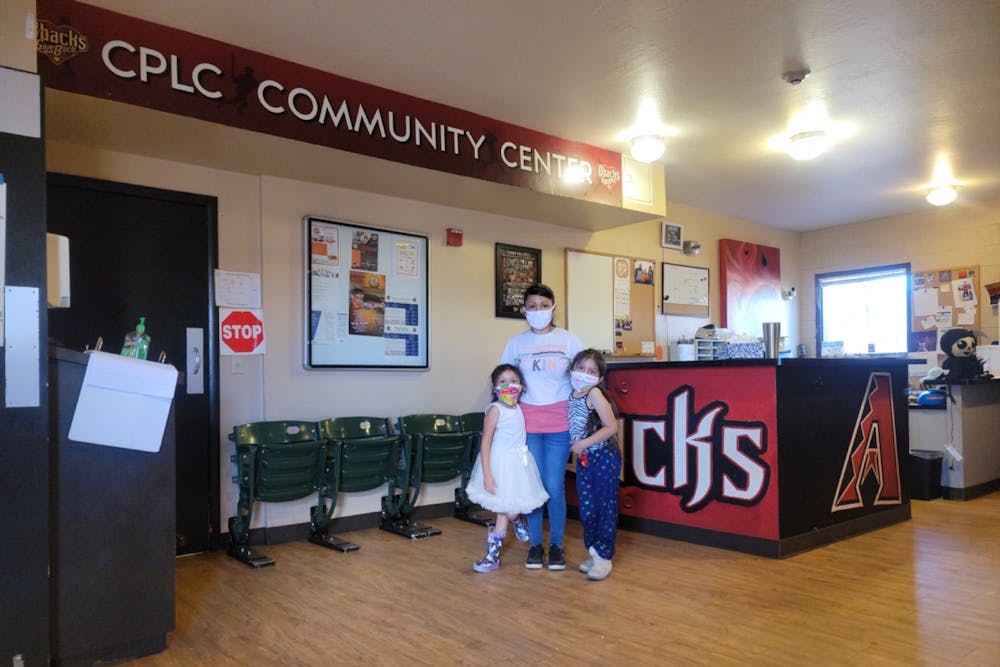When the pandemic began, Phoenix resident Mareli Luna Galindo and her family encountered difficulties switching to remote living during the beginning months of the COVID-19 pandemic.
“It was a hard time with my girls to provide food to the table,” Galindo said. “To my husband — only he was working — to pay rent and electricity.”
When her daughters Emily, a third-grader, and Gisele, a first-grader, began attending school remotely, Galindo had to stay home with her children, and the school gave her only one Chromebook.
The girls had to share the Chromebook for classes and homework during a stressful, scrambled schedule. Galindo searched for a reasonable computer to buy online, but everything was sold out.
In July, she visited Chicanos Por La Causa where she learned about their newest program, Help Our Kids Connect. HOKC provides computers and devices to qualifying families trying to keep their children up-to-date with online learning. CPLC gifted her a Chromebook.
“I can study now and go to classes,” Emily Galindo said. At CPLC, Mareli Luna Galindo can receive resources like tutoring and technical help, and allow her girls to meet other children in a supervised environment.
“When they’re here they’re happy,” Galindo said of the CPLC building. “(CPLC) helps me with food too. Sometimes they have bread, tortillas, so they help me with that.”
So far, CPLC has donated approximately 800 computers to families through HOKC, according to Robert Alvarado, CPLC vice president of information management and technology services. Alvarado said he started the HOKC campaign in April after a conversation he’d had with a couple of moms about five weeks into remote learning.
“They were talking about how their kids were picking up packets every week,” Alvarado said. He was shocked when he heard the schools weren’t providing students with computers. When he came back to the CPLC office, he told his staff, “Let’s do a fundraiser.”
According to Lupe Valenzuela, CPLC strategic planning analyst, the fundraiser was kicked off by 19-year-old ASU junior and intern Celina Villa after she set up a Facebook page asking for donations.
“All of a sudden, three days later, I had $1,500 raised,” Villa said. “It was kind of crazy!”
Villa, a psychology and communication double major, said she became so involved because she saw the campaign as an opportunity.
“Robert was like, ‘I see something in you and I want to bring you onto the team,’” Villa said. “I didn’t see it in this small aspect. I saw it in big colors. I know how important it is to be there for children because they’re the future.”
Earlier in the pandemic, the staff hit a bump in the campaign when they found out there was a three-month backorder on any devices due to high demand.
CPLC responded by partnering with Arizona Students Recycling Used Technology, or AZStRUT, a non-profit organization that recycles computers for refurbished computers. Villa said 95% of the computers and devices CPLC has given to families come from them.
“So they’ve been giving us computers at a high discount price," Alvarado said.
However, not just anyone can receive a device.
“They’ve got to be Section 8,” Alvarado said of the qualifications, referring to Arizona's three housing programs for low-income people. “They’ve got to be part of the free lunch program and falling under that low-income status.”
To provide WiFi to families, CPLC partnered with Cox and their Connect2Compete program in August to offer $9.95 monthly internet service for those who qualify, Valenzuela said.
“Our next goal is that in addition to providing the internet capacity, we provide education,” Valenzuela said. “Because children are now staying with their grandparents. A lot of them might not be tech-savvy.”
Alvarado said he hopes to keep the campaign going even after the coronavirus pandemic ends as he expects online learning won’t go away. He said they are still raising funds.
“We all save the goal,” Villa added. “We want to impact as many lives as we can.”
Reach the reporter at allicripe@gmail.com and follow @acripe2 on Twitter.
Like State Press Sports on Facebook and follow @statepresssport on Twitter.




